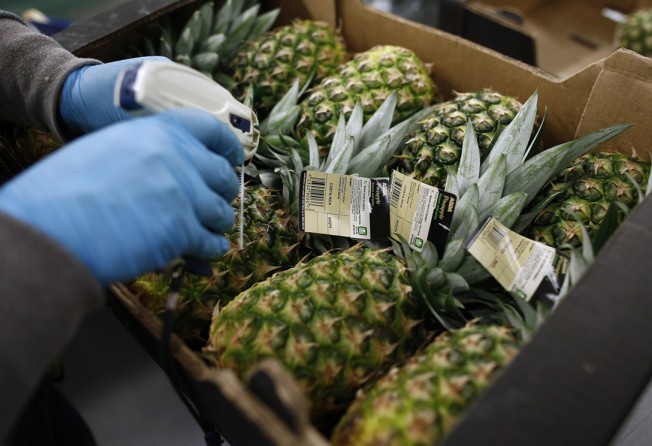
China's rising fruit imports push up demand for refrigerated shipping
Refrigerated container trades benefiting from growing mainland imports of perishable goods

Growth in China's imports of fruit and vegetables is spurring demand for seaborne transport in refrigerated containers, a business benefiting from the rise of an affluent middle class, open trade policies and the advancement of cold treatment technology.

"The same factors that have benefited China's exports over the last 20 years, such as an open trade policy and investment in infrastructure, are now also starting to bear fruit for imports," said Michael Britton, Asia-Pacific region general manager at Hamburg Süd, the world's fourth-largest refrigerated, or reefer, container carrier by fleet size.
Cold chain logistics, historically a weak point for domestic distribution of perishable goods, has attracted significant investment over the past five years.
"Cold storage capacity has greatly improved in China. Before it was pretty basic - brick warehouse, chain link fence and a padlock. But now investments are coming, which enables China to handle more perishable imports," said Britton.
While the mainland's economic slowdown affects the commodities trade, "soft commodities", or perishable goods, are growing at a faster rate, although from a smaller base, according to Britton.
Besides fruit and vegetables, meat and seafood are projected to see a similar trend on the mainland of more imports and fewer exports.
The burgeoning perishables trade is being facilitated by the evolution of refrigerated technology over the past decade. Temperature, the atmosphere and humidity inside a reefer container can now be controlled over a long seaborne journey to manipulate fruit ripening times and extend shelf life. "When goods are discharged at ports, no matter how far away they came from, they are still fresh," said Ng Kar Loke, head of special cargo at Singapore's APL.
As a result, more perishable goods that used to be transported by air are now being shipped by sea freight, slashing transport costs and enabling more affordable prices for consumers.
The sea-leg transport cost for a about 500 grams of cherries from Chile, which takes more than 30 days to reach Chinese consumers, is only 14 US cents, according to Tim Stout, South America west coast general manager at Hamburg Süd.
For shipping lines, reefer trade is a growing niche market that offers higher returns, but with higher upfront investment.
A new reefer container is priced at between US$15,000 to US$20,000 per 20-foot equivalent (teu) unit, eight to 10 times the cost of a dry freight container of the same size. The trade also tends to be more seasonal than dry freight. Consequently, entry barriers may be too high for newcomers. The market has become a battleground for about 10 carriers, even more concentrated than the overall container shipping industry, which counts 20 sizeable players.
The world's reefer container fleet increased by a third to 1.2 million teu between 2009 and 2013, while total seaborne perishable reefer trade increased 13 per cent over the same period to 98 million tonnes in 2013. It is expected to grow at 3 per cent per annum on average in coming years, according to Kevin Harding, director at London-based Sextant Consultancy.
Firms such as Hamburg Süd and Hapag-Lloyd, both based in Hamburg, Germany, are looking to expand reefer capacity. Hamburg Süd, which has 16 per cent of its container fleet in reefers, the highest proportion in the world, said it is planning a sizeable purchase by the end of the year.
Hapag-Lloyd, which is waiting on regulatory approval in various jurisdictions for its merger with Compañia Sud Americana de Vapores, a Chilean carrier, also plans to capitalise on the growth of reefer trade.
"After the merger, our reefer capacity will leap to the world's third-largest," said Clemens Holz, the firm's director of global reefer management.
